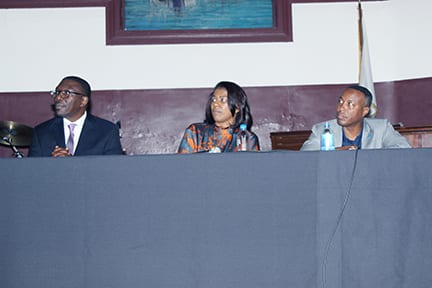By Dr. Tallulah Crawley Shinault
NASHVILLE, TN — The October 28th forum on the state of education, in the black community held at the Jefferson Street Mt. Zion Baptist church, was a good first step in its presentation of a complex education system impacted by social, economic, and political realities of public education in Nashville.
Lead by Drs. Shawn Joseph, Sharon Gentry, and Kevin Rome, the forum was a critical step toward fostering community education, involvement, and participation. Underscoring, the political, economic and social barriers to educational equity, the panel emphasized the need to hold elected officials and school leadership accountable.
In Mrs. Rosetta Perry’s appeal to the audience to Adopt a School, she urged us to share in the responsibility for insuring equity in our schools. Consider, do schools serving students with greater needs have access to resources, funding, and academic support that effectively serve their needs? Not being able to definitively answer this question should give you pause and a desire to know.
Know that a qualified teacher is critical but not a given in every classroom. A look at the 2016-2017 MNPS school report card reveals that the teacher attrition rate for Metro schools doubled the national rate for teachers in the U.S. In Metro schools, the overall retention rate was 82.7 percent, while for priority schools alone, the average retention rate was 75% (MNPS Report card). High vacancy rates and substitute teacher needs undermine educational equity. The report found that Black students were five times more likely to be suspended than Caucasian students. Students scored well below the state average in ELA and math.
“Recognizing that Metro schools is ultimately charged with ensuring academic success of students, the strong correlation between low academic performance and poverty, highlights the needs for greater community role and responsibility in changing these results.” (p.20 Committee Concerns, 2016-2017).
The call to action was made. While we hold our elected officials, school leaders, teachers and parents accountable, we can not wait for budget issues to be addressed, disciplinary inequities resolved, school boards to get along or for the superintendent to be embraced by the establishment. We must get involved.
1. Propose a school adoption program to your church, social organization, or neighborhood association.
2. Review the list of schools recommended in the November 15th Tennessee Tribune issue.
3. Speak with the PTO, school leaders, teachers and parents regarding school needs.
4. Suggest an education collection be taken up each Sunday or meeting day of your organization to purchase shoes, hats, and school supplies, field trips, and books for students.
5. Set up a Big Sisters and Brothers project in your community.
6. Volunteer, Volunteer, Volunteer. Schools need hall monitors, cafeteria monitors, classroom assistants, reading and math tutors.
7. Attend school board meetings.
We can do this! We can make a difference in the lives of our children and our community-Adopt a School.



